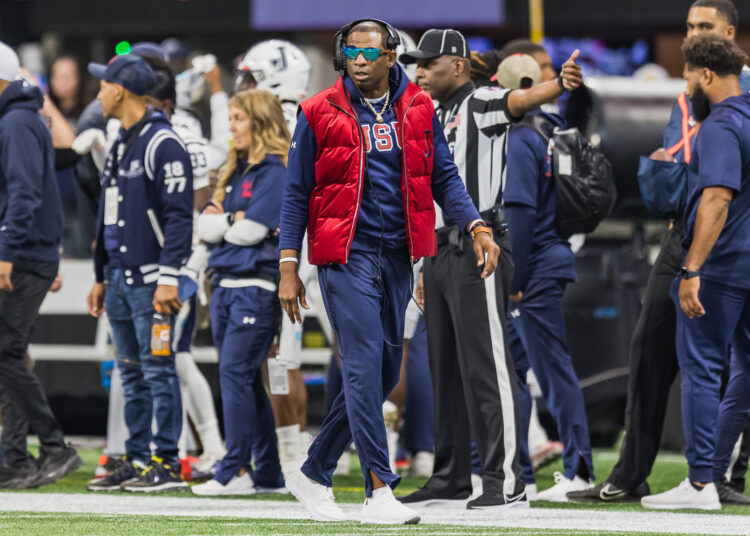The story leading every sports hot take talk show, news outlet, and podcast segment is Caitlin Clark’s WNBA experience.
It has been what you would expect for a rookie leaving college and entering a sphere of veteran players who are physically stronger and have more years in the league than most.
That experience has ignited an all-out war of words at the intersection of race, gender, and, eventually, basketball. At this intersection, longtime WNBA fans are fighting for their lives against an onslaught of troll takes that range from casual ignorance to intentional mean-spirited attacks toward players and the core fanbase.
Now, if only there were a group of people or a community who experienced something similar. If only there was an alleged change agent who came in to save something that didn’t need to be saved at all, bringing in a group of followers who disrespected the work that was put in by the people before them.
Oh, wait.
There is.
Deion Sanders recently made headlines for a return to hip-hop on Yella Beezy’s “Must Be The Money Pt. II,” which samples his 1994 hit “Must Be The Money.” For the record, the original sample is 1981’s “Must Be The Music” by Secret Weapon, a tremendous post-disco dance floor jam, but that’s neither here nor there.
Coach Prime’s final line of his verse was, “Gave the ‘Sip the blueprint, then took the family to Boulder.”

Forgive me for sounding skeptical, but a Jackson State program that boasts Pro Football Hall of Fame names such as the late, great “Sweetness” Walter Payton, “Dr. Doom” Robert Brazille, Lem Barney and Jackie Slater needed any kind of blueprint.
Yet, people continue to believe that Sanders’ brief time in Mississippi’s state capitol elevated Black College Football to unimaginable levels.
I dont understand the hate Deion Sanders is getting. He did HBCU’s a service by coaching at one & is now progressing up the levels of football and taking what he likes along the way. Very weird and confusing seeing yall talk down on him.
— Duncan Powell (@DuncPowell_) February 28, 2023
It’s a delusion similar to the one held by the casuals and cultists who follow Clark, claiming she’s single-handedly responsible for the WNBA and women’s basketball’s popularity.
.@TomiLahren: Without Caitlin Clark the WNBA would be back to selling fewer tickets than a high school production of the Wizard of Oz. pic.twitter.com/jG6Mh6ck35
— OutKick (@Outkick) June 5, 2024
The WNBA should be kissing Caitlin Clark’s feet, not knocking her off of it. She’s the Wayne Gretzky of that league. Without her, no one knows or cares who is playing. This happens with generational players. People know who is special. You protect them at all costs.
— starblazer (@01Starblazer) June 4, 2024
That is proven to be false, as television viewership increased each of the previous three seasons before Clark’s arrival.
No one is denying Caitlin Clark’s basketball ability. She is a phenomenal shooter with limitless range but also a gifted passer who can get the ball to her teammates through impossibly small windows for open shots. Same for Sanders, a two-sport legend who’s won at every level and did lead Jackson State to two Southwestern Athletic Conference titles.
The problem is the discourse these two polarizing personalities incite. Clark, through no fault of her own, is held up as a “Great White Hope” in a league where close to 85 percent of the players are Black and others are queer.
The larger issue within that is on social media, Clark is defended vociferously by Black men who feel the need to insult their own women with insults regarding masculinity and insinuations that they work at restaurants and convenience stores in the offseason.
It’s unlikely she sees herself as a savior who requires defense whenever she gets roughed up. She’ll eventually be forced to make a statement about her fans’ boorish behavior, but that’s largely their issue.
Sanders, however, did not make many friends in the space he swore the God he served placed him. From taking credit for a practice facility that was already in the works to blaming the community for missing items out of his office to noting how Boulder, Colorado had no crime as compared to Jackson, Mississippi.
And because his ego demands to be the center of attention, the literal antithesis of what a Christian will profess to be, Sanders does not correct his followers who allege that HBCU football was in the dumpster before his arrival and returned to said dumpster after his departure.
The parallels are hard to miss. While Clark isn’t responsible for the behavior of new WNBA fans who aren’t really fans at all, the loyal core audience is alienated from the game they supported and championed for so long.
HBCU football is just now recovering from the alleged “Prime Effect” conversations that only made way for splash hires that have been, to date, very hit or miss.
Signing up to be a part of a cult is a very dangerous thing, not just for the blind loyalists but for the people with common sense who just want to enjoy sports without being reminded of the myth that one person is responsible for the success of an entire community.


